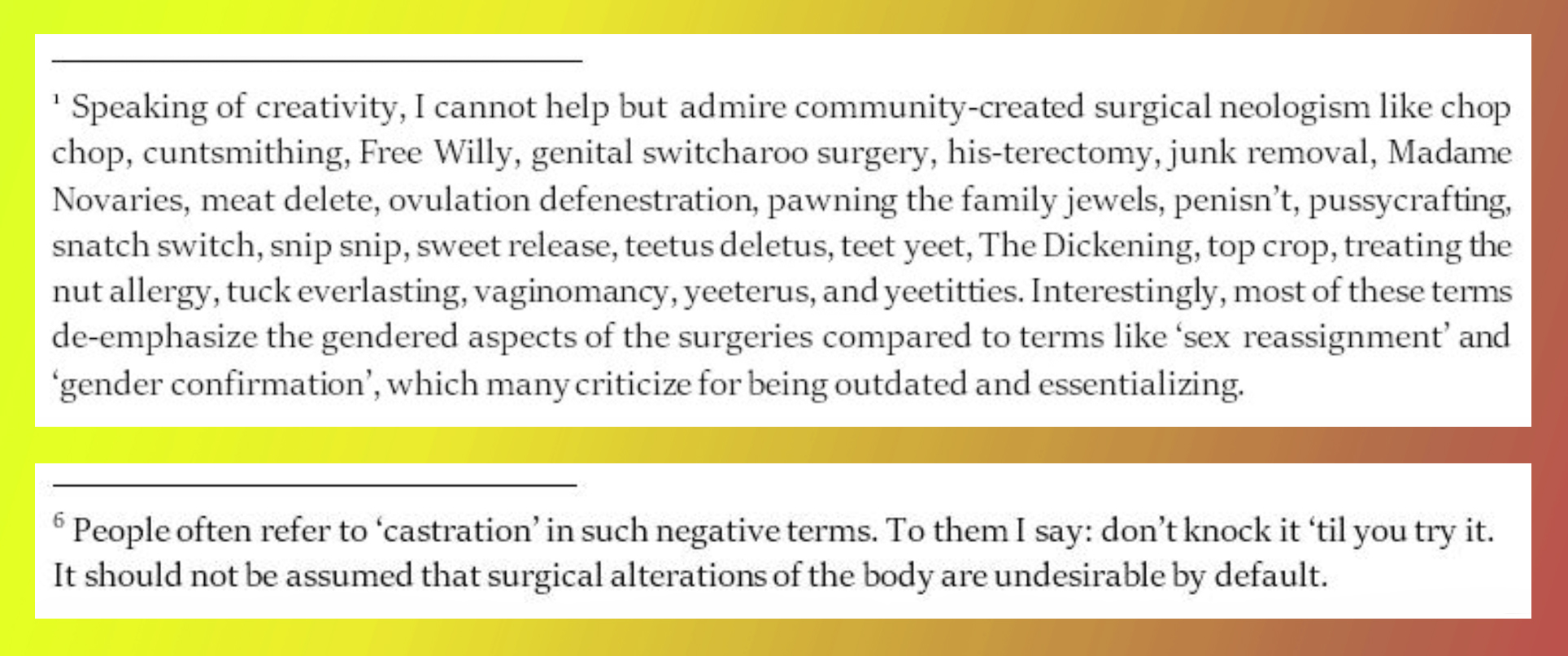writing
Philosophy Journal Horror Stories (updated)
By request, here is a post for people to share their journal “horror stories.”
[Originally posted March 2, 2021; reposted by request.]

Why? For one thing, it may be a relief to learn that the universe, or at least the journals, are not out to get you in particular. But also, there is the possibility, suggested by one of those making the request, that the stories, in the aggregate, reveal some patterns or issues that we can then figure out how to address.
Before we begin, now would be a good time to invoke my multi-purpose adage, “philosophers are people, too.” That includes the philosophers who are the editors of and referees for academic journals. People make mistakes, people have multiple demands on their time, people get tired, and so on. Further, these people are often volunteers or inadequately compensated, adding to their busy lives the various responsibilities of maintaining a significant portion of our professional ecosystem. So even when we may be sharing stories that reveal their imperfections, I think it is important to register appreciation for all the work they do.
UPDATE (3/2/21): A few complaints in the comments below about Pacific Philosophical Quarterly prompted a reply from Janet Levin (USC), chair of the editorial committee of the journal. In it, she writes:
We recently discovered that, due to a major error in our record-keeping process, over 100 manuscripts submitted to the PPQ over a period of a little over a year were misclassified as having undergone an initial review. There was a confluence of factors that allowed the error to go undetected for so long, some due to COVID-19, some technological, and others due to a diffusion of responsibility in the reviewing process – these factors also contributed to some failures to respond to author inquiries. When we discovered the extent of the problem we made the difficult decision to try to clear the backlog as quickly as possible, and therefore (i) to do an unusually thorough reading of papers during the internal review process to enable us to get results back to authors as quickly as possible, and (ii) not to give comments on papers that we did not send out for external review. We understand the costs of having a paper tied up at a journal for so long, and recognize the burden it places on authors waiting for a response. I take full responsibility for this unfortunate situation and apologize sincerely for our lapse. We are overhauling our processes for submission and evaluation of manuscripts to make sure not only that nothing like this happens again, but also that, going forward, the PPQ can be exemplary in giving authors quick decisions. We will announce more concrete steps in this regard soon, including a new faculty editor who will be taking over after the end of this semester.
UPDATE (3/5/21): Regarding Oxford Studies in Ancient Philosophy (mentioned in a couple of the comments below), current editor Victor Caston (University of Michigan) reports that this past October he told the journal’s publisher, Oxford University Press, that he would not be seeking to renew his contract with them when it expired. It is now expired, and Professor Caston is maintaining the journal while waiting for OUP to put a new editor or editorial team in place. See also this post at Endoxa from Caleb Cohoe (Metropolitan State University of Denver).
Note: The new comment platform appears to have carried over previous email-name affiliations. That is, it will think your name is whatever you previously used as your name when you last commented with that email address. So even if you enter in a new handle, your comment may be sent to subscribers with your old name, or if you edit your comment, it may publicly attribute that edit to your old name. In general, I encourage commenters to use their real names; so I hope that most of the time, for most people, this will not be an issue. But if you think it is important to use a pseudonym on this post, I suggest that when commenting you enter an email address you haven’t previously used here before. (Email addresses are not revealed to the public.)
Additional note about pseudonyms: as per the comments policy, pseudonyms may not contain the words “anonymous, “anon,” etc.
The post Philosophy Journal Horror Stories (updated) first appeared on Daily Nous.
How To Write A Philosophy Paper: Online Guides
Some philosophy professors, realizing that many of their students are unfamiliar with writing philosophy papers, provide them with “how-to” guides to the task.
[Originally posted on January 15, 2019. Reposted by reader request.]

I thought it might be useful to collect examples of these. If you know of any already online, please mention them in the comments and include links.
If you have a PDF of one that isn’t online that you’d like to share, you can email it to me and I can put in online and add it to the list below.
Guidelines for Students on Writing Philosophy Papers
- “Guidelines on Writing a Philosophy Paper” by Jim Pryor
- “Writing a Good Philosophy Paper” by Justin Weinberg
- “Writing a Philosophy Paper” by Peter Horban
- “Tips on Writing Philosophy Papers” by William Blattner
- “How to Write (not Terrible) Philosophy Papers” by Manuel Vargas
- “Philosophy Paper Writing Guidelines” by Tim O’Keefe and Anne Farrell
- “A Guide to Writing” by Michael Huemer
- “Guidelines on Writing a Philosophy Paper” by Stephen Yablo
- “7 Steps to a Better Philosophy Paper” by Bryan W. Roberts
- “Some Writing Tips for Philosophy” by Brian Earp
- “How to Write a Crap Philosophy Essay” by James Lenman
- “A Sample Philosophy Paper” by Angela Mendelovici
- “Writing Philosophy Essays” by Michael Tooley
- “Writing Your Philosophy Paper: Common Problems to Avoid” by Elijah Millgram
- “A Guide to Philosophical Writing” by Elijah Chudnoff
- “The Pink Guide to Philosophy” by Helena de Bres
(Crossed-out text indicates outdated link.)
The post How To Write A Philosophy Paper: Online Guides first appeared on Daily Nous.
The Appropriateness of Appropriateness
A journal’s editorial team conditioned the acceptance of an article on the removal of two footnotes they said were “distracting,” its author reports. Distracting how? The author thinks the editors judged the footnotes to be salacious, and thus inappropriate for the journal, though it’s not clear that was their reasoning.

Among the questions the episode raises are: How do norms of appropriateness function in editorial judgments? How ought they?
The journal in this case is Mind, the author is Florence Ashley (University of Alberta), and their article, recently published—sans the footnotes in question—is “What Is It Like to Have a Gender Identity?” Here’s an excerpt from the abstract:
By attending to how people speak about their gender, we can find diverse answers to the question of what it is like to have a gender identity. To some, it is little more than having a body whereas others may report it as more attitudinal or dispositional—seemingly contradictory views. In this paper, I seek to reconcile these disparate answers by developing a theory of how individual gender identity comes about.
And here are the footnotes that, Ashley reports, the editors insisted be removed in order for the paper to be accepted (skip if you’re offended by vulgarity, mentions of surgery, references to genitalia, or puns):

Ashley said in a message that the footnotes were questioned during the peer review stage, adding:
I wrote a substantive defense in my response to reviewers. Eventually, they made it clear that the only thing standing in the way of official acceptance was removing the footnotes and that they wouldn’t publish the paper with them. The official reason was that they were distracting, but it is difficult for me to see it as anything other than prudishness.
Ashley also expressed a concern that there’s a risk of “stifling” discourse when “what is considered improper is one of the better ways to make a point, which may happen more in subfields relating to gender and sexuality.”
According to Mind‘s editors, Lucy O’Brien (UCL) and Adrian Moore (Oxford), the editorial team has a policy of not publicly commenting on its editorial work in relation to specific papers. It’s a reasonable policy, but what it means is that we do not have their side of the story. So it’s quite possible that salaciousness was not the issue at all. Maybe they were concerned that the lightheartedness of the notes was disrespectful for such a sensitive topic. Maybe they deemed the notes’ relevance to the paper’s central argument too tenuous. Maybe they hate puns. While we may be Mind readers, we are not mind readers, so the bottom line is that we don’t know for sure.
In any event, the point of this post is not to condemn the editors. Even if we assume Ashley is correct in their interpretation of the decision, an editor making judgments in accordance with a sense of appropriateness that differs from the author’s is not necessarily objectionable. Were an editor to, for example, insist as a condition for an article’s publication that an author remove from it a racist joke possibly relevant to but unnecessary for the author’s argument, most of us would think the editor is acting well within their rights.
Better than condemning anyone involved in this would be to getting a grasp of the variety of cases in which something like a moralistic or aesthetic sense of “what is appropriate for this journal” is plausibly the explanation for suggested or required revisions of a manuscript. Does it happen a lot or a little? Is it more or less common in certain subfields of philosophy or on certain topics? Has it happened to you?
Then we might be in a better position to assess under what conditions, and to what extent, such editorial pressure is (or is not)… appropriate.
The post The Appropriateness of Appropriateness first appeared on Daily Nous.
The Rise of English as the Global Lingua Franca of Academic Philosophy (guest post)
“We think it is more or less inevitable at this point that English will be the global lingua franca of academic philosophy for the foreseeable future. We also think it is for the most part a good thing. But it has also produced some problems…”
In the following guest post, Peter Finocchiaro (Wuhan) and Timothy Perrine (Rutgers) argue that “the rise of English as the global lingua franca of academic philosophy might lead to several epistemic goods being unjustly distributed in our community, including credibility, education, and the standing to speak.”

The Rise of English as the Global Lingua Franca of Academic Philosophy
by Peter Finocchiaro and Timothy Perrine
Academic philosophy is a global institution. Nearly every country has universities with philosophy departments. Philosophy journals are read around the world. And many philosophers grow up in one country, get a PhD in another, work in a third, and have students who come from a fourth. Like many global institutions, academic philosophy has increasingly relied on English as a shared language for communication—as a global “lingua franca”. When a Finnish philosopher meets a Colombian philosophy at a conference in Japan, they will likely do philosophy in English.
We think it is more or less inevitable at this point that English will be the global lingua franca of academic philosophy for the foreseeable future. We also think it is for the most part a good thing. But it has also produced some problems for our community—problems that we think need to be analyzed and addressed so that philosophy can be more inclusive.
To get a sense of the kinds of problems we have in mind, consider the following case. A philosopher is fluent in English, having learned it as a second language. Their academic research consists in reading and writing in English. But a recent referee report complains that their paper is “not idiomatic” (even though the referee doesn’t identify a single passage that is unclear, disorganized, or obscure) and requests that the philosopher have their paper checked by a “native” speaker of English. So, to appease the referee, the philosopher reaches out to a “native” English speaking colleague. Both philosophers then spend some time trying to guess what’s not “idiomatic” so that the language can be “fixed” and the paper can be published.
Maybe this sort of thing hasn’t happened to you. But it’s almost certainly happened to someone you know or someone that you’ve read. It has happened several times to our coworkers and friends.
In a new paper of ours, we argue that these problems are instances of language-related injustice. The paper is part of a new special issue of Philosophical Psychology on understanding bias. Thanks to the generous support of Lex Academic, it is freely accessible here for 12 months as the winner of the Lex Academic® Essay Prize for Understanding Linguistic Discrimination.
As we argue in the paper, in the above case the philosopher gets labelled as a “non-native” speaker of English and is held to certain linguistic norms set by a “native” English speaking community. But satisfying those norms is unnecessary for understanding their paper. We analyze this and other cases using the framework of epistemic injustice, specifically distributive epistemic injustice (though we think there can be other frameworks that are also useful). We argue that the rise of English as the global lingua franca of academic philosophy might lead to several epistemic goods being unjustly distributed in our community, including credibility, education, and the standing to speak.
At the end of our paper, we consider some proposals for dealing with these. They are:
1A: Increase assistance with English—journals should provide English-language services such as proofreading at no cost to the author.
1B: Abandon “readability” standards—journals should stop evaluating submissions on the basis of “readability”, including how “idiomatic” the English is as well as its “flair” or “style”.
2A: Diversify the canon—philosophers (and journals) should engage with work from a wide range of traditions, not just the mainstream Western canon.
2B: Expand the SEP—articles written for the SEP should be translated into other languages and/or the SEP should commission original entries in other languages.
3A: Increase non-native English speaker representation—editorial boards of journals, admissions committees of graduate programs, etc., should include more non-native speaking philosophers.
3B: Increase cross-linguistic representation—journals should publish material that spotlights non-English language philosophy, especially that which is produced in non-Anglophone countries.
Readers may recognize some of these proposals. In 2021, Filippo Contesi created the Barcelona Principles for a Globally Inclusive Philosophy, which was discussed on Daily Nous here, with related discussion here. Contesi’s Principle 3 is almost identical to our Proposal 3A, and Principle 1 is very similar to our Proposal 1B.
In our paper, we briefly argue that the B proposals are better than the A proposals. As we see it, Proposal 1A is likely to just reinforce unnecessary linguistic norms that privilege native speakers; a better alternative, as expressed by Proposal 1B, is to abandon the enforcement of those linguistic norms. Proposal 2A is admirable and in general we favor diversifying the cannon. But we doubt it would do much to address the linguistic injustices we are worried about. A better alternative, as expressed by Proposal 2B, is to make current high-quality research more accessible to people from different linguistic backgrounds. Proposal 3A is similarly admirable, but non-native speakers are likely already overburdened with administrative tasks. A better alternative, as expressed by Proposal 3B, is to increase the representation of current research from philosophical communities working in languages other than English.
Maybe our evaluation of these proposals isn’t exactly right. We’re open to being corrected about that since an adequate evaluation should rely on a complex balance of empirical facts, personal experiences, and communal structures that we can’t claim to be experts in. We’re more interested in bringing greater attention to the conversation that Contesi and others have started: what should be done about the problems caused by English becoming the global lingua franca of academic philosophy? Indeed, since the both of us are “native” speakers of English, we’re eager to hear more from others, especially “non-native” speakers.
So let us know what you think of these proposals, and let us know what you think about other proposals that we haven’t mentioned. Additionally, we’d be interested in hearing about people’s experiences that don’t neatly fit into the cases we give above or in the full paper. At the end of the day, what we want is for academic philosophy to be more inclusive for all of its members around the globe.
The post The Rise of English as the Global Lingua Franca of Academic Philosophy (guest post) first appeared on Daily Nous.
Write thoughts
Like pretty much all the posts on this blog this one represents another unfinished thought. I am prompted to write this because I re-read my previous post, Showies. In it I began with my usual nostalgic claptrap before wending my way into my experience of the Silver City Show. I then clumsily fizzled out in a paragraph about Showies. I painted myself into a corner with my own thoughts. I was in the midst of trying to untangle my words and thoughts when I realised the day was ending.
I wanted to write about all the people out having fun on Saturday night. I ran out of time. It was Sunday night H needed some guidance with his homework and I wanted to keep Re company cooking dinner. So, I did that instead.
Here is a picture I was going to use on the Showies post to pointlessly illustrate something.

See… pointless
In other news I am thinking I would like to enable mobile users to read the text in the tags. If you are reading this before my future self has found a solution you may occaisonally notice an emphasised word. If you are on a computer and you hover your mouse cursor over that word a definition may appear. If you are on a phone or tablet that doesn’t happen. A twiddly detail I know but that right there is the kind of nerdly thing I tend to focus on here. I’ll let you know how I go.
Writetyper

Live edit text in your web-browser
Just a quick post to remind myself of the data URI scheme. This is something I should be incredibly familiar with given my history of work but I am mostly clueless.
This morning I have been helping my partner compose a bunch of words. The process has involved lots of to and fro with temporary swathes of text which I have quickly edited before sending back. I found using the data URI scheme to be a quick and efficient method to hammer out text without flipping between apps and windows.
Everything is in the browser. I pasted the code below into a new tab in my browser and just started typing
data:text/html,
So bloody easy.
Footnote:
the title of this post is taken from the code word used to get infinite lives in Jet Set Willy.

Only when you complete the game do you find all the amenities
You had to type it in whilst in the room with the toilet under the stairs and the door to the master bedroom guarded by Maria the housekeeper who was angrily tapping her toes. Maria would not allow you entry until you had cleaned up after the previous nights wild party.
In Conversation with Lolita Chakrabarti
Part of the Humanities Cultural Programme, one of the founding stones for the future, Stephen A. Schwarzman Centre for the Humanities on Thursday 13th May 2021. Join us for a fascinating evening with award-winning playwright and actress Lolita Chakrabarti in conversation with journalist Matt Wolf. Streamed live from an Oxford venue and chaired by Dr Sos Eltis, the event will cover Lolita’s wide-ranging career and hone in on her most recent play, Hymn, at the Almeida Theatre.
Lolita Chakrabarti is an award-winning playwright and actress. Writing credits include the award-winning stage adaptation of Life of Pi, which will open in the West End in 2021, the ambitious Invisible Cities (MIF), Hymn (Almeida) and Red Velvet, which opened at the Tricycle Theatre before transferring to London’s West End and New York. Acting credits include playing Queen Gertrude, opposite Tom Hiddleston, in Sir Kenneth Branagh's Hamlet (RADA), Fanny & Alexandra (Old Vic) and Free Outgoing (Royal Court). A Casual Vacancy (BBC1/HBO), To Provide All People (BBC2), Beowulf (ITV), Jekyll and Hyde (ITV), Riviera (Sky), Criminal (Netflix) and Defending The Guilty (BBC).
Matt Wolf is an American theatre critic based in London, where he has spent his entire professional life. He moved to the UK directly upon graduating from Yale, where he read English and was co-arts editor of the Yale Daily News (a good place to begin). Soon upon arrival in London, he found work in a self-created job as arts and theatre writer for the Associated Press (AP), where he remained for 21 years.
Along the way, following brief stints at the Wall Street Journal/Europe and The Hollywood Reporter, Matt became London theatre critic for Variety from 1992-2005, during which time he was freelancing regularly for The International Herald Tribune – now the International New York Times. Following the departure from his long-held post of the august Sheridan Morley, Matt became London theatre critic for the IHT/INYT, and in 2009 was thrilled to help birth The Arts Desk – an arts-centred website that within a few years of its inception was named best specialism journalism website at the Online Media Awards in London. He remains theatre editor at that site and reviews there across the cultural spectrum.
In addition to his journalism, Matt has collaborated on two books – one about Guys and Dolls, the other about Les Miserables – and is the author of Sam Mendes at the Donmar: Stepping into Freedom, an account of the theatre and film director Sam Mendes’s extraordinary tenure at one of London’s premier theatrical addresses. Matt sits on the panel of the Evening Standard Theatre Awards and is on the faculty of both NYU/London and the V&A Museum; he can be heard regularly on various radio programmes for both the BBC and Monocle.
Following an acclaimed, sold-out live-streamed and on-demand runs, Lolita Chakrabarti's Hymn will be broadcast on Sky Arts on Sunday 18 April at 9pm. The world premiere of this production was directed by Blanche McIntyre and features actors Adrian Lester and Danny Sapani. Sky Arts is free to watch on Freeview Channel 11. Sky and NOW subscribers can also watch Hymn on-demand after the broadcast.
Lolita Chakrabarti is a HCP Visiting Fellow part of the Humanities Cultural Programme.
Gentle and Fierce
At the beginning of 2019 I began work on a new book. I started it knowing I wanted to write a set of stories that were based around my relationships to animals, and how animals had figured in my life. As a writer I’m most interested in how memory exists within and outside of us, how other people and beings and objects and places act as memory triggers. I wondered what might arise if I turned this way of thinking towards the animals of my life.
Gentle and Fierce is the result: a collection of 20 illustrated essays that examine the presence of animals in my life and memory. It will be in bookstores this July, and you can read more about it for now at the publisher’s website.
As the publication date comes closer I will share a little more about the stories in the book and the process of writing them, but for now, here is a glimpse of some of the desks at which I worked on Gentle and Fierce.
How to write a southern life: Ethics and writing practices
Eduardo Lalo, Elleke Boehmer, Jonny Steinberg and Premilla Nadasen give a talk for the Southern Biographies event. Chaired by, Hélène Neveu Kringelbach.
Southern Biographies: epistemologies, methodologies, theoretical perspectives
Joy Owen, Marcio Goldman, Ramon Sarro and Santanu Das give talks as part of the Southern Biographies event. Chaired, Thomas Cousins.





